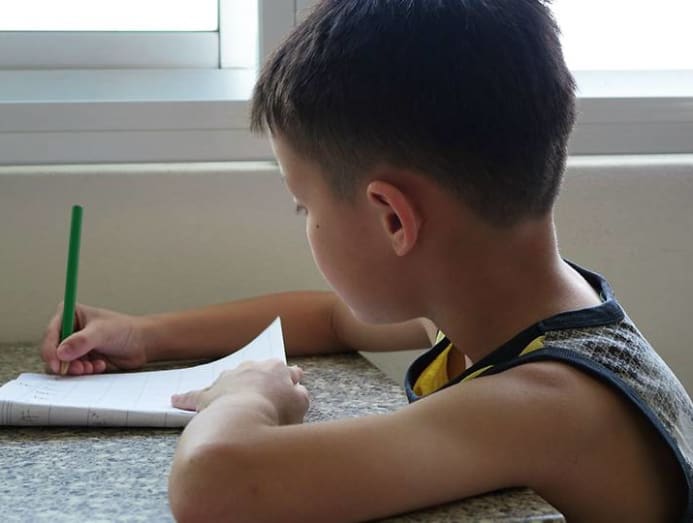Commentary: Raising bilingual children is challenging but immensely rewarding
SINGAPORE: Parents in Singapore often report significant stress when raising children to speak their mother natural language.
In spite of their best efforts, even at a very young age, children can simply refuse to speak in the mother tongue. This tin cause family strain and even disharmony around bilingualism.
Even though parents value the ethics of bilingualism, in practice, raising multilingual children can exist challenging.
READ: Commentary: In English-speaking Singapore, children face huge challenges in mastering mother natural language
This is not limited to Singapore. Annick de Houwer, a linguistics professor in Germany, has written extensively of "harmonious bilingualism".
Noting parents might feel shame when their children resist speaking their female parent tongue, or that children's resistance towards the mother tongue can cause internal family conflict, Professor de Houwer is a strong and powerful advocate for cultivating positive attitudes towards bilingualism within the family.
Only for many parents in Singapore, mother tongue learning has become the stuff of classrooms deeply intertwined with bookish success. Every bit a issue, children too tin can associate the mother natural language primarily with homework, exams, and rote learning, causing stress.
READ: Commentary: Learning another linguistic communication has benefits - just non the economic kind
GENUINELY Difficult TO Raise BILINGUAL CHILDREN
Raising bilingual children is genuinely hard. Unfortunately, information technology oftentimes becomes harder equally children get older.
All over the world, there is prove that children gravitate towards the language of their peers and larger community as they mature.
For many in Singapore, that language is English. As our children grow, they experience a strong desire to socially conform to their surroundings.
For example, children start speaking like their peers in terms of accent and colloquialism, shedding the home accent in favour of the accent used amongst their friends.

In a similar way, speaking the language that prevails in the larger customs can become a powerful force. For many students, English language is as well the language of popular culture and entertainment choices, which gives it a great deal of social entreatment.
READ: Commentary: The irksome death of cable Television set and why cutting the string isn't also painful
Fifty-fifty children who have potent mother tongue proficiency in early childhood, after a few years of chief schoolhouse in English, can become dominant users of English language over the mother tongue.
Children'southward views of their mother tongue tin can plough from positive to negative within a few short years. For this reason, igniting children's motivation to speak their mother natural language can exist a meaning challenge.
CULTIVATING POSTIVITY AROUND MOTHER Natural language
Then, what can we practise? Commencement, we can innovate our children to environments where the use of the mother tongue is relevant and useful to children in their own eyes.
In my experience as a bilingualism researcher and as a parent of bilingual children, I have noticed that as adults, we often cite specific reasons for why we want our children to know their mother tongue that are important to u.s. every bit parents.
We ofttimes think about how helpful their mother tongue will be in their adult lives, for their bookish test scores and afterwards success, and other existent-earth factors that don't always appeal to children.
Instead, thinking nigh reasons that might resonate with a child may be more constructive. What opportunities volition children feel they volition miss out on if they do not know their female parent tongue? Are those opportunities of personal value to the kid?
READ: Commentary: The benefits of bilingualism go beyond knowing two languages
Studies have shown that children who see the language as relevant to their personal goals larn it more readily and with greater motivation than those for whom female parent tongue use is limited to the classroom.
A special connection with a warm and caring mother tongue teacher, an affinity for songs or games associated with i's culture and language, or a special bail with a grandparent who speaks the mother tongue can engage children in their heritage language.

It'due south worth remembering that for each child, the touchpoint with the mother tongue is different. As with most things, young children'south preferences can exist highly idiosyncratic.
Learning about what makes your own child tick with regards to the mother tongue and building off that connection with the language tin can assistance a kid break through motivational barriers.
PERSISTENCE IS Key
One of the most common complaints I hear from parents is that their child has stopped talking to them in the mother tongue and simply wants to communicate in English.
READ: Commentary: Surviving home-based learning in the long haul may require parents to dial back on kiasuism
This is very mutual: Many children go through a phase where they resist or altogether refuse responding in the mother tongue, fifty-fifty if they tin sympathize what is beingness said.
When faced with these challenges, information technology is easy to default back to English language. Just persistence is central.
Without creating negativity and tension, families should continue to speak in their mother natural language to children to provide connected exposure and gradually build children's willingness to appoint in conversation.
In general, children who speak (and non simply sympathize) the mother natural language fare meliorate with bilingualism than those who merely understand. Parents should encourage and motivate children to use the female parent tongue, all the while accepting that this may be a long and gradual process.
READ: Commentary: What hope do monolingual parents accept in raising bilingual children?
To help with mother natural language learning, bilingualism researchers take oftentimes argued for setting up individualised goals.
Is your main goal for your child to go a high PSLE score, for your kid to eventually live in the country where the female parent natural language is ascendant, to keep contact with extended family, for your children to laissez passer the language onto their children, or some combination of factors?

Recognising and acknowledging these goals can help families to directly their efforts and resources to the kind of bilingualism they aspire to. In thinking of ways to realise these goals, developing strategies to foster the kid's personal interest is very beneficial to female parent tongue learning.
Edifice A PERSONAL Connexion WITH MOTHER TONGUE
Finally, it can cause stress for some bilingual families when their children aspire to drop the mother natural language at the offset opportunity – particularly if information technology has been a source of intense academic stress or if the kid feels disinclined towards learning additional languages.
I ofttimes poll my students on their human relationship with their mother tongue. Those for whom the mother natural language serves as a social or family connector frequently limited more fondness and motivation for the mother tongue than those whose female parent tongue experience has been purely bookish.
Building a personal connection with the mother tongue, outside of the classroom, can go a long way towards encouraging its use.
READ: Commentary: It will exist a waste matter if parents don't keep flexible work arrangements
Even for parents whose children take dropped the mother tongue, they can take some comfort in research that suggests children who learnt a 2d linguistic communication earlier in life observe it easier to pick information technology back up equally adults, even when they have trivial or no memory of it. Languages encountered early in life hold a special and dedicated place in our heed and aren't easy to erase.
There is no doubt that raising multilingual children tin be challenging for many families. It is nigh certainly a marathon, not a sprint.
Just the rewards can be immense. Knowing our mother tongue can bring swell joy and fulfillment, every bit well as valuable connections to our extended family, personal history, and civilization.
Leher Singh is Associate Professor and Managing director of Inquiry at the Department of Psychology, Faculty of Arts and Social Sciences, National Academy of Singapore.
0 Response to "Commentary: Raising bilingual children is challenging but immensely rewarding"
ارسال یک نظر